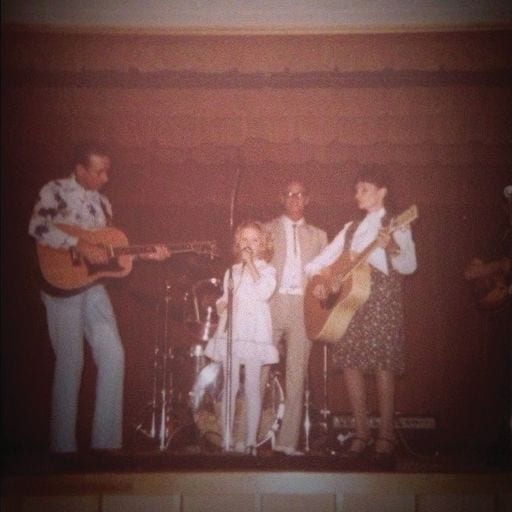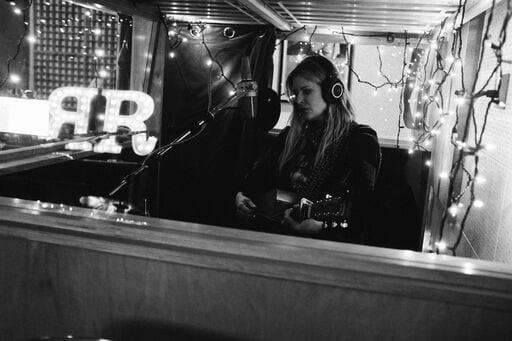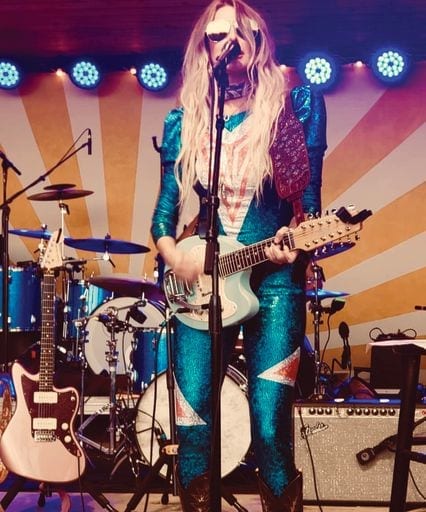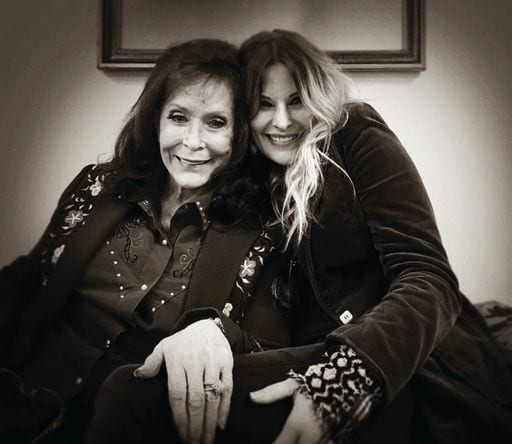Elizabeth Cook, who grew up singing as a child in central Florida, has carved out her space as a singer, radio deejay, and tv personality.
Nashville singer-songwriter Elizabeth Cook was discovered at age 4 by her first booking agent and promoter—her mother Joyce.
“One day I heard her out in the yard—she was swinging on her swing set, just singing away,” said Joyce in a 2005 interview.
The child had real talent, Joyce understood. It wasn’t long before young Elizabeth was singing at bars and fairs and festivals in and around her hometown of Wildwood, Florida.
Joyce, who died in 2008, had been an aspiring hillbilly singer in the Appalachian Mountains. After escaping a horrible marriage, she took her five children to live with family in central Florida. She fell in love with an ex-con who had several children of his own.

Thomas Cook had landed in the Atlanta Federal Penitentiary for running moonshine. He learned to play the upright bass as a member of the prison band.
Thomas and Joyce “were madly in love,” and they shared a love of music, too, playing in honky-tonk bands together. Elizabeth, their only child together, was born when they were in their 40s and barely getting by. They were living in a motel room at the time of her birth.
When Elizabeth showed extraordinary promise as a singer, her career became their focus. They found backing musicians for her, and mom even wrote songs for her. One of those was called “Does My Daddy Love the Bottle (More Than he Loves Me)?”
“Daddy was a raging alcoholic,” Elizabeth explained. The song inspired Thomas to give up drinking. Elizabeth recorded a handful of songs for a small Florida-based record label as a child. People took notice of her talent. Some good gigs came her way. It looked like Elizabeth Cook might really have a shot at a career in music.

Every year, hundreds of young singers migrate to Nashville hoping to gain a foothold in the world of country music. Few bring a personal background as fascinating and steeped in what-country-songs-are-made-of stuff as Cook’s.
And not that many have her combination of charisma, creativity, and powerful vocal talent: With an authentic, twangy— and beautiful—voice that recalls a bygone era of country music, along with a wickedly clever sense of storytelling and timing, Cook has been compared to the genre’s greatest female performers.
“(Cook) has the sweet voice of Dolly Parton and the feistiness of Loretta Lynn,” declared a 2016 article in the Nashville Tennessean.
So, naturally, back in the mid-’90s, when she moved to Nashville as a young adult, Cook had her sights trained on becoming … an accountant. That’s right. The former child singer had taken a job with PriceWaterhouse as an accountant.
Though she had continued performing during high school, Cook was also strong in the classroom and decided that a college education held more promise than the uncertainty of the music industry. To the mild dismay of her parents, she attended Georgia Southern University, where she studied accounting and computer information systems.
Her job with PriceWaterhouse seemed like a great opportunity—a nice salary working at a top firm—but it didn’t take long to make her miserable. “I didn’t fit in,” Cook said. “I felt like this eccentric hillbilly person in that culture. And there was no creativity in the job—that killed me.”
In the meantime, Cook hadn’t really given up on music entirely. During college, she’d sing for friends at fraternity parties or sit in with bands at local dives. And after moving to Nashville, “it was still a dream in back of my mind.”
While the music business can be cutthroat and talent alone is rarely a guarantee for success, the industry helps to support an active and interconnected community in Nashville of songwriters, session instrumentalists, and singers.

Cook quickly drew notice and landed a publishing contract as a songwriter. Her demo recordings earned additional attention, and in 2002 she released the album “Hey Y’all” on the Warner Bros. record label. The album earned critical praise, but it wasn’t a commercial success, and Cook was released from her contract.
This is where Cook’s story in the music business could have ended. Instead, it’s where her place as an independent, ambitious, and creative woman arguably becomes more interesting.
Cook may not be a household name, but she has forged a career for herself in country music. She has released four albums since “Hey Y’all,” all to positive critical reception, and is set to put out another set of original material this summer.
Peter Cooper, a music journalist now on staff at the Country Music Hall of Fame, has known Cook since before she put out her major-label debut. He says Cook’s success is a rare thing: “We often think of success in the music business as making millions of dollars and playing arenas. After a few days in Nashville—a town that’s a magnet for people who want to make music—you come to realize that extraordinary success in music is being able to sing and play for a living. If you can do that, you’re in the 99th percentile. Elizabeth has carved herself a place in music, through talent and personality, tenacity, and inventiveness.”
Cook’s niche as a singer and songwriter is in a style of country music that’s true to the genre’s roots but generally doesn’t produce contemporary radio hits. Fans and critics sometimes refer to this sound as “alternative” or “outlaw” country, or Americana.
Cook has performed at the Grand Ole Opry, the venerated Nashville and country music institution, more than 400 times. “The Opry is a show about tradition and reverence for tradition,” she said. “You participate out of respect, and I love that.”
Audiences at the Opry and far beyond loved her classic country sound and her earnest songs. Her music has taken her to stages in Australia, Europe, Asia, and all corners of the U.S.
Cook’s world-class voice is the main attraction, but fans are also drawn to her natural charm and sense of humor.
Jeremy Tepper, program director for SiriusXM satellite radio’s Outlaw Country channel, interviewed Cook following the release of her 2007 album, “Balls.”
“I heard the way she came through during the interview, and I thought, ‘That gal’s got it,’” he said. Tepper offered Cook a spot as an Outlaw Country deejay. She was reluctant but decided to give it a go. Rather than working out of a traditional radio studio, she records into a computer audio production program. That way, she can keep up with the radio program, which she calls “Elizabeth Cook’s Apron Strings,” from home or even when she’s touring for her main job as a singer.
The Outlaw Country format includes songs by classic artists, such as Johnny Cash, Waylon Jennings, and Loretta Lynn; rock ’n’ roll greats, including Tom Petty and Bruce Springsteen; and contemporary Americana artists like Lucinda Williams and Buddy Miller.

Between songs, Cook tells stories connecting back to her childhood and her career as a musician. She comments on current events. She offers up pieces of homespun, offbeat advice.
“I’d had no training in radio,” she said. “I accidentally developed some sort of idiot savant approach to doing it: I just talk. I don’t plan it. I mix up my words. I stutter and cough. I cuss.” It’s not the slickly produced, focus-group-tested program of your typical FM radio drive time segment. And maybe for that reason, “Apron Strings” caught on.
“Are you kidding? She’s beloved,” Tepper said. “She’s got avid fans who just hang on her every word.” In any given radio market, a SiriusXM channel may have a smaller audience than a top-rated local station. But satellite radio programs can reach listeners nationwide. As Tepper notes, Outlaw Country’s audience is wide-ranging and diverse. It includes “truckers and country fans from a hardscrabble background” as well as urban hipsters and devoted folk and roots music fans. One of those who discovered Cook’s “Apron Strings” was David Letterman.
“I’ve listened to you—I don’t know—five or six months on the radio, and I’ve taken quite a liking to your personality,” he told Cook when he had her on “Late Show with David Letterman” in 2013.
She was great on the show—funny and friendly and full of stories that had the audience and Letterman charmed. Letterman showed pictures of the prison band her father had played in. Cook pointed to a prisoner shown in one of the photographs who didn’t play an instrument but had an important role nonetheless: “This guy right here,” she said, pointing at the old black-and-white image, “he didn’t play anything. But they let him come along on the gigs … he had to give them cigarettes to get to go.”
Letterman laughed throughout the interview, clearly disarmed by Cook’s life story and quick humor. She returned to the show several times for interviews and as a guest performer. Cook continued to chart her own path as a songwriter as well. Her 2010 album, “Welder,” garnered positive reviews and included deep reflections on her personal life. The album’s title is in honor of her father’s post-jail profession. The songs “Heroin Addict Sister” and “Mama’s Funeral” speak to tragedy and loss. Other tunes—“El Camino” and “Rock N Roll Man” among them—were a rollicking good time.
For all the exciting developments in her career, Cook was going through a difficult time personally. Her parents died within five years of each other. She lost several other family members. Her marriage dissolved.
Cook went to rehab. She has acknowledged that she “needed some help,” but is critical of the rehab experience. Still, she came through it engaged creatively. “Exodus of Venus,” released in 2016, displayed a raw, bluesy side of her artistry—again, to a positive critical reception.
Cook is excited about the new material slated for release this summer and feels good about the process. “I’m getting my health back, and I feel I’m writing from a clearer place,” she said.
Meanwhile, Cook continues to grow as a multidimensional entertainer. In addition to “Apron Strings,” she’s working on a television program. The Circle Network, a subsidiary of the Opry Entertainment Group, is putting Cook on the air with her own fishing show, “Upstream.” It won’t necessarily be the place for advice on bait rigs—the idea is to showcase Cook’s sense of fun and her talent as a conversationalist as she takes interview subjects out to ponds and streams to drop hooks in the water. “Sometimes we catch fish, and sometimes it’s a disaster,” she explained.
Surveying the landscape of her life and career, Cook is reflective about her upbringing and the choices she’s made. Had she followed through on her original Nashville plan—forging a career as an accountant—she would likely have enjoyed greater financial stability and predictable upward mobility. But she’s fulfilling a dream—as much her parents’ as her own—and it means a great deal. She knows she made them proud.
“For a hillbilly girl conceived in a hotel room, moving into a trailer park in central Florida—to get to play music for a living, and to work with the people I’ve gotten to work with, and to go to all the different places I’ve gotten to go to and see, it’s really something.”
By Baker Maultsby

